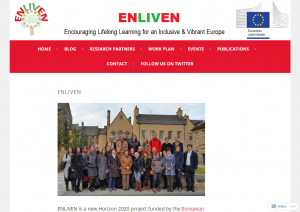ENLIVEN – Encouraging Lifelong learning for an Inclusive and Vibrant Europe (2016-2019)
How can adult learning support best young adults (18-34) during their early occupational years? What is known about effective policies enhancing learning opportunities available for young adults? How is it possible to unleash the learning potential of workplaces which have been recently taken by young adults?

Which institutional frameworks support the learning of young adults and allow individual progress from a more marginal to a promising and stable position in the labour market? Which types of policy intervention have been proven as successful in helping to overcome barriers to learning participation? How can ‘ladders of support’ be implemented successfully so that they empower young people to leave precarious positions and work towards full economic and social integration?
These were some of the key research questions of the ‘ENLIVEN’ project, funded by the European Commissions´ Horizon 2020 programme. 10 research organisations from 7 European countries and Australia participated in the three year cross-country comparative research project (2016-2019).
The ENLIVEN project comprised 11 work packages (WPs) in 4 clusters:
- Cluster 1 examined programmes, governance and policies in EU adult learning, looking at the multi-dimensional nature of social exclusion and disadvantage.
- Cluster 2 studied system characteristics to explain country/region-level variation in lifelong learning participation rates, with particular reference to disadvantaged and at-risk groups and to young people.
- Cluster 3 investigated the operation and effectiveness of young adults’ learning at and for work, undertaking cross-country comparative organisational and institutional analysis.
- Cluster 4 developed and tested an Intelligent Data Support System (IDSS) for evidence-based policy-making and debate applying ‘case-based reasoning’ technologies.
Together with the team of the Slovak Academy of Science, 3s lead the third cluster. Partners implemented 16 extensive organisational case studies in three economic sectors (retail, metals, adult education), including interviews with 64 young adults on their ‘learning biographies’ in eight countries. Special attention was given to institutional frameworks, shaping the learning opportunities available at work. Forms of collective interest representation of young adults were studied in particular.
Results of the project are published at the project’s webpage.
Contact: Günter Hefler (hefler@3s.co.at)

